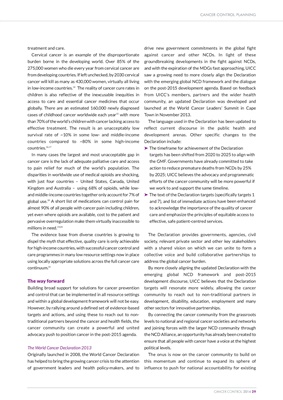
CANCER CONTROL PLANNING
30 CANCER CONTROL 2014
References
1. Nugent, R. A., & Feigl, A. B. 2010. Where have all the donors gone? Scarce donor
funding for non-communicable diseases. Center for Global Development.
2. World Health Organization. 2013. World Health Assembly Resolution WHA66.2
Programme Budget 2014-2015. Geneva: World Health Organization
3. World Health Organization. 2011. Global Status Report on Noncommunicable Diseases
2010. Geneva: World Health Organization
4. United Nations. 2013. A New Global Partnership: Eradicate Poverty and Transform
Economies through Sustainable Development, The Report of the High-Level Panel of
Eminent Persons on the Post-2015 Development Agenda. New York: United Nations.
5. United Nations. 2013. A life of dignity for all: accelerating progress towards the Millennium
Development Goals and advancing the United Nations development agenda beyond 2015,
Report of the Secretary-General. New York: United Nations.
6. The NCD Alliance was founded by four international NGO federations representing
the four main NCDs - cardiovascular disease, diabetes, cancer, and chronic respiratory
disease. Together with other major international NGO partners, the NCD Alliance
unites a network of over 2,000 civil society organizations in more than 170 countries.
The mission of the NCD Alliance is to combat the NCD epidemic by putting health at
the centre of all policies.
7. Leadership Council of the Sustainable Development Solutions Network. 2013. An
Action Agenda for Sustainable Development, Report for the UN Secretary-General.
http://unsdsn.org/files/2013/06/130613-sdsn-an-action-agenda-for-sustainabledevelopment-final.pdf
8. NCD Alliance. 2013. NCD Alliance Response to the UN-NGLS Consultation on Post-2015
Reports. Available at: http://www.ncdalliance.org/post2015resources
9. United Nations. 2011. Political Declaration of the High-level Meeting of the General
Assembly on the Prevention and Control of Non-communicable Diseases
10. Bloom, D. E., Cafiero, E. T., Jane-Llopis, E., et al. 2011. The Global Economic Burden of
Non-communicable Diseases. Geneva: World Economic Forum.
11. Nugent, R. A., & Feigl, A. B. 2010. Where have all the donors gone? Scarce donor funding
for non-communicable diseases. Center for Global Development.
12. World Health Organization. 2011. Scaling up action against noncommunicable diseases:
how much will it cost? Geneva: World Health Organization.
13. Nugent, R. A., & Feigl, A. B. 2010. Where have all the donors gone? Scarce donor funding
for non-communicable diseases. Center for Global Development.
14. Ferlay J, Soerjomataram I, Ervik M, Dikshit R, Eser S, Mathers C, Rebelo M, Parkin DM,
Forman D, Bray, f.globocan 2012 v1.0, Cancer Incidence and Mortality Worldwide:
IARC CancerBase No. 11 [Internet]. Lyon, France: International Agency for Research
on Cancer; 2013.
15. Ribeiro RC, Steliarova-Foucher E, Magrath I, Lemerle J, Eden T, Forget C, Mortara I,
Tabah-Fisch I, Divino JJ, Miklavec T, Howard SC, Cavalli F. 2008. Baseline status of
paediatric oncology care in ten low-income or mid-income countries receiving My
Child Matters support: a descriptive study. Lancet Oncology 2008 Aug;9(8):721-9
16. ibid
17. Pritchard-Jones, K., Pieters R., Reaman, G. H., Hjorth, L., Downie, P., Calaminus, G.,
Naafs-Wilstra, M. C., Steliarova-Foucher, E., 2013. Sustaining innovation and improvement
in the treatment of childhood cancer: lessons from high-income countries.
www.thelancetoncology.com Published online Februray 20, 2013
18. Treat the Pain. 2013. Access to Essential Pain Medicines Brief. Available from:
http://www.treatthepain.org
19. Cherney, N.I., Baselga, J., de Conno, F., Radbruch, L. 2010. Formulary availability and
regulatory barriers to accessibility of opioids for cancer pain in Europe: a report from
the ESMO/EAPC Opioid Policy Initiative. Annals of Oncology 21: 615-626, 2010
20. Cherny NI, Cleary J, Scholten W et al. The Global Opioid Policy Initiative (GOPI)
project to evaluate the availability and accessibility of opioids for the management of
cancer pain in Africa, Asia, Latin America and the Caribbean, and the Middle East:
introduction and methodology. Ann Oncol 2013; 24 (Supplement 11): xi7-xi13.
21. Knaul, F. M., Frenk, J., & Shulman, L. 2011. Closing the Cancer Divide: A Blueprint to
Expand Access in Low and Middle Income Countries. Harvard Global Equity Initiative.
Boston: Global Task Force on Expanded Access to Cancer Care and Control in Developing
Countries.
commitments within the Political Declaration and the
GMF, and to push for cancer to be mainstreamed in the
post-2015 development agenda. l
Cary Adams was born in London and has a BSc Honours degree
in Economics, Computing and Statistics from the University of
Bath, United Kingdom and a Masters degree (with Distinction)
in Business Administration. He is a Harvard Business School
Alumni having attended the School's Executive General
Management programme in 2003.
In 2009, he made a career change, moving from the
management of international businesses in the banking sector
to become CEO of the UICC, based in Geneva. He is also Chair
of the NCD Alliance, a coalition of around 2,000 NGOs working
on non-communicable diseases, which includes cancer,
diabetes, heart and respiratory diseases.
Rebecca Morton Doherty joined UICC in 2011 as Advocacy and
Programmes Coordination Manager, and continues to
coordinate UICC's advocacy efforts in the non-communicable
diseases arena, with an increasing focus on the post-2015
development agenda.
She has a BA Honours degree in Political Sciences from the
University of Warwick, and a Masters degree in Gender and
Development from the London School of Economics. Prior to
joining UICC, Rebecca spent six years working in London and
and Geneva-based NGOs in advocacy and communications
roles.